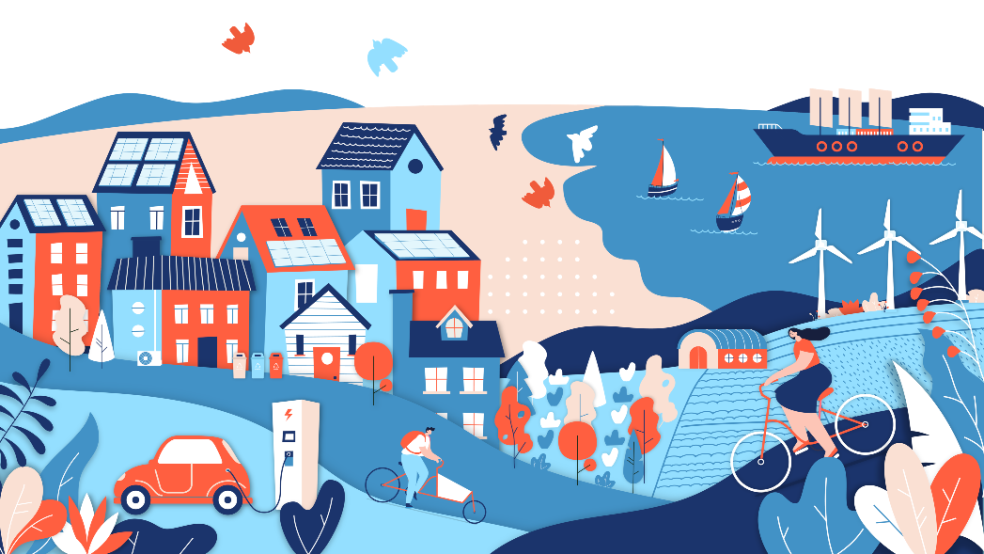
Carbon Plan reveals how all of Devon can achieve net-zero
After hearing from Devon residents young and old, businesses and from across all sectors of our economy, in a series of public consultations, workshops and a Citizens' Assembly, the final version of the Devon Carbon Plan has been published today (Tuesday 27 September), by the Devon Climate Emergency partnership.
Supported by the latest scientific evidence, the Plan is Devon’s roadmap to becoming net-zero by 2050 at the latest, spelling out what we all have to do to create a resilient, sustainable county where people and nature can thrive.
Its publication follows a summer where the impact of human-induced climate change has never been more apparent. Summer 2022 was the joint hottest on record, with four of the five warmest summers for England occurring since 2003.
Through choosing what we buy, how we travel, and how we live the Carbon Plan highlights the long-term changes we can all make to help reduce our impact on the planet.
Additionally, the Plan sets out a range of detailed, evidence-based solutions and strategic objectives for national and local policy makers in areas such as energy production, transport, and the buildings we live and work in.
It has been delivered by Devon Climate Emergency, a partnership of 29 businesses, public bodies, and voluntary groups, including Devon’s 11 principal councils.
Between now and the New Year each one of those organisations will be called on to endorse and demonstrate how they will use their responsibilities and influence to enact the Plan.
Most emissions (68 per cent) in Devon come from buildings – our homes and workplaces - and on-road transport. Sliced another way, 74 per cent of all emissions relate to the energy we use, from the oil and gas that power our economy, fuels our cars, and heats our homes.
The Carbon Plan sets out in stark terms that to achieve net-zero we must increase the amount of renewable energy we produce and use. Currently just seven per cent of Devon's energy comes from sustainable sources – it needs to be almost 100 per cent by 2050.
The Chair of the Devon Climate Emergency Response Group, Meg Booth, said:
"This Carbon Plan is the culmination of the latest scientific evidence and citizen participation, without which this plan would not have been possible, and I want to thank everyone involved.
“This is a plan that speaks to us all. It is the responsibility of all of us to adopt what each of us can individually from this Plan.
“There are things that we each must do to adapt our behaviour, to reduce our individual carbon footprint. There are also things that councils, businesses, and other organisations can do to help people reduce our county’s carbon footprint. And there are things that need to be done nationally, to reduce the country’s carbon output.
“In Devon, the decarbonisation of transport, improving the energy efficiency of our buildings and the transition towards renewable energy are essential if this county is going to reach the 2050 target.
“However, it is also critical that the transition to a low-carbon economy is fair, and that no area of society is unfairly disadvantaged.
“To ensure that we achieve our goals and can track our progress and resolve any issues, a series of oversight boards, made up of community representatives, including young people and specialists, will be created.
“This is the best, perhaps only, opportunity for Devon to become net-zero by 2050.
“I have no doubt that we will make the transition to a low-carbon economy, an economy which is just, fair and right for our county.”
Professor Patrick Devine Wright of the University of Exeter and Director of ACCESS* Chaired the Task Force of experts that led the drafting of the Plan, and he said:
“We must change if we truly want to make a difference, and truly want to stop this planet from becoming inhospitable to biodiversity and humankind.
“Change can be hard, but it’s achievable. This Plan sets out some very simple things that we can all do that will make a difference in reducing our carbon.
“I want us to focus on what each of us can do now; and what we can strive to do and commit to it. I don’t want us to look back and say why did we leave it too late.
“Making homes more efficient, transport cleaner and moving away from fossil fuels, can help address the cost-of-living crisis and concerns about energy supply. These changes bring with them a raft of opportunities for Devon, including new, skilled jobs.”
All organisations are encouraged to sign the Devon Climate Declaration through the Devon Climate Emergency website to show the growing support for taking action.
The full Devon Carbon Plan will be available on the DCE website from 9am Tuesday September 27.
The link will also include a Quick Read version, highlighting the key actions that Devon can take to become net-zero by 2050 at the latest.
* ACCESS is a five-year climate and environmental social science project which aims to work collaboratively with local and national government, organisations and businesses to support the transition to a sustainable and biodiverse environment, and net zero society.













